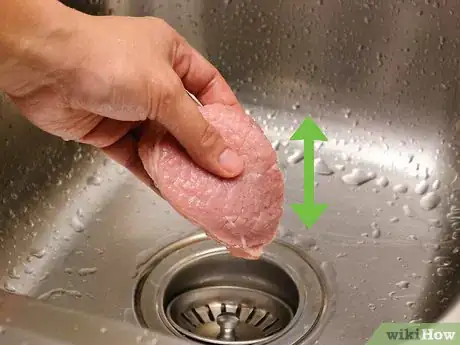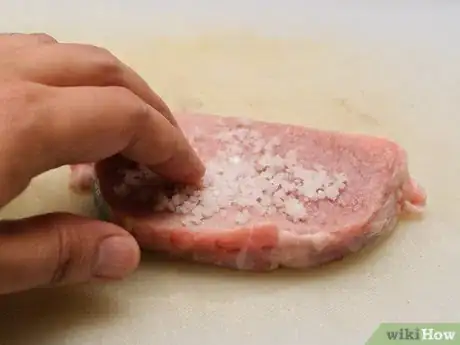wikiHow is a “wiki,” similar to Wikipedia, which means that many of our articles are co-written by multiple authors. To create this article, 11 people, some anonymous, worked to edit and improve it over time.
wikiHow marks an article as reader-approved once it receives enough positive feedback. In this case, 93% of readers who voted found the article helpful, earning it our reader-approved status.
This article has been viewed 135,901 times.
Learn more...
To comply with Jewish dietary requirements, meat and fowl must be prepared in a special way to make the flesh kosher and acceptable for cooking and eating. Blood must be drawn out with water and salt or broiled out. Though the process of koshering (or kashering) meat and fowl is fairly simple, it requires time, and the protocol must be followed exactly to make the meat fit for Jewish kitchens.
Steps
Washing and Soaking
-
1Wash the meat or fowl thoroughly to remove any visible blood. Blood will be drained from meat in the salting process to make it kosher. Before washing the meat, cut out any clots.
-
2Soak the meat in water at room temperature for at least a half hour. Meat left to soak for 24 hours or more becomes non-kosher.[1]
- If you like, cut the meat into smaller pieces after soaking.
Salting
-
1Wash the meat with water again before salting. It is okay to use the water in which you soaked the meat. Inspect the meat to make certain there is no visible blood.[2]
-
2Shake off the water and allow the meat to sit on the salting board to allow excess water to dry. Keep the meat damp enough so salt sticks to it but not so wet the salt dissolves easily.[3]
-
3Salt the meat thoroughly -- top, bottom and sides -- with coarse salt. Do not put so much salt on the meat that blood cannot drain out.
-
4Allow the meat or fowl to sit on the salting board for at least an hour. Allow the blood to drain into a tub or basin. Do not allow the meat to be salted for more than 12 hours as this may make the meat unkosher.[4]
- If you leave salt on the meat for more than 12 hours, consult a rabbi as to whether the meat is still kosher.
Broiling
-
1You may also kosher meat by broiling.[6]
- Wash the meat or fowl.
- Salt the meat or fowl.
- Cook the meat on an open grill over flames until a crust forms and the meat is half done. Allow drippings to collect in a pan. The grill and pan must be used only for kashering meat.
-
2Finished.
Community Q&A
-
QuestionWhen kashering meat with salt, is 100% of the blood removed from chicken meat?
 Biplob28Community AnswerYes. Meat and fowl must be prepared in a special way to make the flesh kosher and acceptable for cooking and eating. Blood must be drawn out with water and salt, or broiled out. Though the process of koshering (or kashering) meat and fowl is fairly simple, it requires time, and the protocol must be followed exactly to make the meat fit for Jewish kitchens.
Biplob28Community AnswerYes. Meat and fowl must be prepared in a special way to make the flesh kosher and acceptable for cooking and eating. Blood must be drawn out with water and salt, or broiled out. Though the process of koshering (or kashering) meat and fowl is fairly simple, it requires time, and the protocol must be followed exactly to make the meat fit for Jewish kitchens. -
QuestionIs all kosher salt used for koshering meat non-iodized?
 Biplob28Community AnswerYes! Salt is a mineral, and as such, pure salt is always kosher. Some brands of salt have a kosher symbol on the package, and that way you know that a reliable kosher certification agency is checking to make sure that nothing else gets mixed in to the salt.
Biplob28Community AnswerYes! Salt is a mineral, and as such, pure salt is always kosher. Some brands of salt have a kosher symbol on the package, and that way you know that a reliable kosher certification agency is checking to make sure that nothing else gets mixed in to the salt.
Warnings
- When the meat is on the salting board, make sure nothing impedes the flow of blood off the board and away from the meat. If necessary to make room, you may place cuts of meat on top of each other as long as blood does not collect.⧼thumbs_response⧽
Things You'll Need
- Knife
- Water
- Soaking basin
- Coarse salt
- Salting board
- Tub or basin to catch blood
- Grill
- Pan to catch blood
References
- ↑ https://www.chabad.org/library/article_cdo/aid/82678/jewish/Koshering-Meat.htm
- ↑ https://www.myjewishlearning.com/article/making-meat-kosher-between-slaughtering-and-cooking/
- ↑ https://www.myjewishlearning.com/article/making-meat-kosher-between-slaughtering-and-cooking/
- ↑ https://www.growandbehold.com/blog/making-kosher-meat/
- ↑ https://www.chabad.org/library/article_cdo/aid/82815/jewish/Koshering-Liver.htm
- ↑ https://www.star-k.org/articles/articles/1133/kashering-liver/































































Medical Disclaimer
The content of this article is not intended to be a substitute for professional medical advice, examination, diagnosis, or treatment. You should always contact your doctor or other qualified healthcare professional before starting, changing, or stopping any kind of health treatment.
Read More...